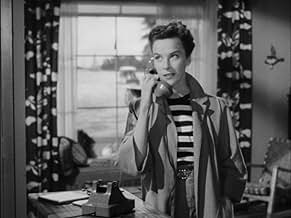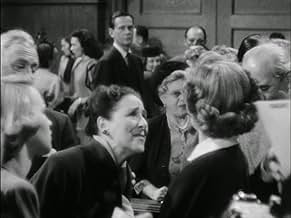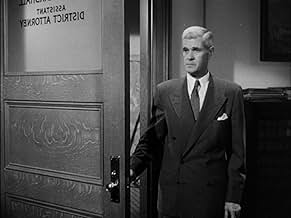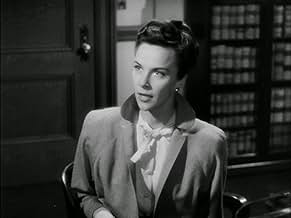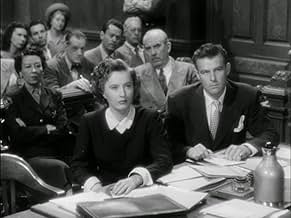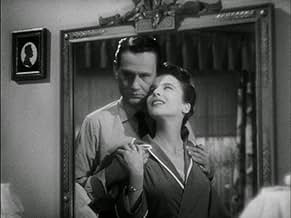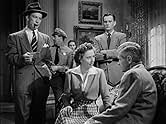NOTE IMDb
6,9/10
3,4 k
MA NOTE
L'assistante du procureur Cleve Marshall tombe amoureuse de la mystérieuse Thelma Jordon alors qu'elle cherche à résoudre les vols autour de l'héritage de sa tante.L'assistante du procureur Cleve Marshall tombe amoureuse de la mystérieuse Thelma Jordon alors qu'elle cherche à résoudre les vols autour de l'héritage de sa tante.L'assistante du procureur Cleve Marshall tombe amoureuse de la mystérieuse Thelma Jordon alors qu'elle cherche à résoudre les vols autour de l'héritage de sa tante.
- Réalisation
- Scénario
- Casting principal
Kasey Rogers
- Dolly
- (as Laura Elliot)
Gertrude Hoffman
- Aunt Vera Edwards
- (as Gertrude W. Hoffman)
Kate Drain Lawson
- Clara
- (as Kate Lawson)
Avis à la une
The File On Thelma Jordon turns out to be an extensive one indeed. Had Wendell Corey examined it more fully he might never have gotten into the jackpot he did.
A lot of critics compare this film with that other Stanwyck classic, Double Indemnity. There are certainly elements of that story in The File On Thelma Jordon. But I also see a lot of resemblance as well to the Dick Powell-Lizabeth Scott-Jane Wyatt noir film, Pitfall. If you've seen that one it involves a married, but bored Dick Powell casually drifting into an affair with Lizabeth Scott and getting sucked into some criminal enterprise. Joan Tetzel steps into the role of the wronged wife and was every bit as good as Jane Wyatt was in Pitfall.
One desultory night as Wendell Corey is working late and getting helped along with a little libation, in pops Barbara Stanwyck to the District Attorney's office to complain about the lack of action the police have been giving to her complaints about someone trying to break into her house where she and her elderly aunt live. Corey's state of inebriation seems to be loosening any moral restraints and Barbara leaves him hooked and begging for more.
So when the elderly aunt is in fact murdered, Corey doesn't think like an officer of the court, but instead he's using the gray cells in his male member to make decisions. He winds up prosecuting Stanwyck and paying for high priced defense attorney Stanley Ridges on the side. By the way Ridges is one shrewd article and suspects what's up, but keeps his mouth shut.
Paul Kelly is in the Edward G. Robinson role as another member of the District Attorney's office who realizes this case has far more layers to this than originally thought.
The film is definitely one that should satisfy Barbara's legion of fans.
A lot of critics compare this film with that other Stanwyck classic, Double Indemnity. There are certainly elements of that story in The File On Thelma Jordon. But I also see a lot of resemblance as well to the Dick Powell-Lizabeth Scott-Jane Wyatt noir film, Pitfall. If you've seen that one it involves a married, but bored Dick Powell casually drifting into an affair with Lizabeth Scott and getting sucked into some criminal enterprise. Joan Tetzel steps into the role of the wronged wife and was every bit as good as Jane Wyatt was in Pitfall.
One desultory night as Wendell Corey is working late and getting helped along with a little libation, in pops Barbara Stanwyck to the District Attorney's office to complain about the lack of action the police have been giving to her complaints about someone trying to break into her house where she and her elderly aunt live. Corey's state of inebriation seems to be loosening any moral restraints and Barbara leaves him hooked and begging for more.
So when the elderly aunt is in fact murdered, Corey doesn't think like an officer of the court, but instead he's using the gray cells in his male member to make decisions. He winds up prosecuting Stanwyck and paying for high priced defense attorney Stanley Ridges on the side. By the way Ridges is one shrewd article and suspects what's up, but keeps his mouth shut.
Paul Kelly is in the Edward G. Robinson role as another member of the District Attorney's office who realizes this case has far more layers to this than originally thought.
The film is definitely one that should satisfy Barbara's legion of fans.
The File on Thelma Jordon is directed by Robert Siodmak and written by Ketti Frings and Marty Holland. It stars Barbara Stanwyck, Wendell Corey, Paul Kelly, Joan Tetzel, Stanley Ridges and Richard Rober. Music is by Victor Young and cinematography by George Barnes.
Assistant district attorney Cleve Marshall (Corey) falls for Thelma Jordon (Stanwyck) after she seeks help solving a problem with prowlers and burglars. But is there more to Thelma than meets the eye?
Probably due to availability issues in home viewing formats, this appears to be one of film noir legends Siodmak and Stanwyck's under seen pictures. Which is a shame, for although it is often tagged as something of a lesser value Double Indemnity, it's a noir that noir lovers can get great rewards from.
As we are in noirville the plot isn't at all surprising. Stanwyck fronts up for what we expect is femme fatale duty, Corey looks to be on course for being a hapless loser dude, Kelly is up for some tough copper portrayal, while Rober stalks the edges of the frame as bad news bloke. A despicable crime is at the core of the story, and characterisations are straight out of the dark alleyway (Thelma has murky secrets and ideals, Wendell is unhappily married with a drink problem). Running at 100 minutes in length, the pic does feel a touch too long, especially given that the first thirty minutes is focused on building the principal players, where they are at in their life and the build up of their relationship. This asks for faith in staying with the piece, in hope it rewards for the following hour plus. Thankfully it does.
As the crime arrives, we are treated to noir nirvana as per style of film making. It's the middle of the night in a house menaced by shadows as the wind bashes an open window shutter. For a good twenty minutes, prior to - during - and post the crime, the house is a scary monstrous place, perfect for a dark deed to be enacted. The great Siodmak (The Killers, The Spiral Staircase, Criss Cross) is in his element on this, where aided by the superb photographic skills of Barnes (Rebecca, Force of Evil), the staging of scenes and the visuals enhance the moody machinations of the plot. As does Young's dramatic musical score. So with acting performances comfortably on par for the good, the tech credits are high.
Irks come with that drawn out first third of film, and the ending poses some question marks as well. Personally I would have liked it to have finished five minutes earlier, but as it stands there's a sort of double whammy with the finale. Some will find it contrived, others will applaud the ultimate outcome since it doesn't cop out. Either way, this is a noir film worthy of seeking out for the like minded purveyors of such things. 7/10
Assistant district attorney Cleve Marshall (Corey) falls for Thelma Jordon (Stanwyck) after she seeks help solving a problem with prowlers and burglars. But is there more to Thelma than meets the eye?
Probably due to availability issues in home viewing formats, this appears to be one of film noir legends Siodmak and Stanwyck's under seen pictures. Which is a shame, for although it is often tagged as something of a lesser value Double Indemnity, it's a noir that noir lovers can get great rewards from.
As we are in noirville the plot isn't at all surprising. Stanwyck fronts up for what we expect is femme fatale duty, Corey looks to be on course for being a hapless loser dude, Kelly is up for some tough copper portrayal, while Rober stalks the edges of the frame as bad news bloke. A despicable crime is at the core of the story, and characterisations are straight out of the dark alleyway (Thelma has murky secrets and ideals, Wendell is unhappily married with a drink problem). Running at 100 minutes in length, the pic does feel a touch too long, especially given that the first thirty minutes is focused on building the principal players, where they are at in their life and the build up of their relationship. This asks for faith in staying with the piece, in hope it rewards for the following hour plus. Thankfully it does.
As the crime arrives, we are treated to noir nirvana as per style of film making. It's the middle of the night in a house menaced by shadows as the wind bashes an open window shutter. For a good twenty minutes, prior to - during - and post the crime, the house is a scary monstrous place, perfect for a dark deed to be enacted. The great Siodmak (The Killers, The Spiral Staircase, Criss Cross) is in his element on this, where aided by the superb photographic skills of Barnes (Rebecca, Force of Evil), the staging of scenes and the visuals enhance the moody machinations of the plot. As does Young's dramatic musical score. So with acting performances comfortably on par for the good, the tech credits are high.
Irks come with that drawn out first third of film, and the ending poses some question marks as well. Personally I would have liked it to have finished five minutes earlier, but as it stands there's a sort of double whammy with the finale. Some will find it contrived, others will applaud the ultimate outcome since it doesn't cop out. Either way, this is a noir film worthy of seeking out for the like minded purveyors of such things. 7/10
Perfectly decent noirish outing with excellent performance from Barbara Stanwyck, even if she has done much the same before. Small argument in my house where both my son and wife reckoned that the only problem was that they couldn't see the attraction of the femme fatale herself! I certainly beg to differ and feel most drawn to the feline duplicity of her sinister assuredness, but there we go. Even so a great tale that keeps twisting nicely so that even though you know she must be a baddie, the ever turning tale, especially when we get to court keeps you guessing. Wendell Corey is impressive as the assistant DA if not as a lover, but that's just me.
.... What is a pretty lady doing here in the middle of nowhere all alone, interested in a married man with middling prospects?
Assistant DA Cleve Marshall (Wendell Corey) feels misunderstood and unappreciated. His wealthy father-in-law keeps interfering and showing up on important and rather private occasions such as wedding anniversaries and doing things that indicate that Cleve is held in only medium esteem by said father-in-law. So one night he is getting drunk at his office over this situation when previously mentioned pretty lady (Barbara Stanwyck as Thelma Jordan) comes into the office and asks for the other assistant DA, Miles Scott (Paul Kelly), but he isn't there, so Thelma tells her problems to Marshall.
Marshall acts disinterested in the reason she came in - break-ins at her wealthy aunt's secluded home. He flirts with her. He gets even more drunk and obnoxious, then kisses her. And yet the next day she returns and gets even friendlier with him. But Cleve never asks that question - Why unavailable me who did not exactly put my best foot forward last night? They start seeing each other when they can and then something happens that makes it awfully convenient for Thelma to know somebody in the DA's office - Her aunt is murdered and her safe robbed one night, and she looks like a suspect.
Stanwyck and Corey made one other film together - "The Furies", and I thought they had good screen chemistry, which I would have never believed until I watched this. Paul Kelly gives a good supporting performance as the other assistant DA. He goes hard on a murder suspect when doing the questioning, shooting out sarcastic remarks. That's rather ironic when you realize Kelly served two years in prison for manslaughter during the late 1920s, something that apparently had no impact on his acting career. Also note that the two kids playing Wendell Corey's children actually are Wendell Corey's children.
Last but not least, kudos to Victor Young for his wonderful score. He really made looking for a pencil in the dark seem suspenseful.
Assistant DA Cleve Marshall (Wendell Corey) feels misunderstood and unappreciated. His wealthy father-in-law keeps interfering and showing up on important and rather private occasions such as wedding anniversaries and doing things that indicate that Cleve is held in only medium esteem by said father-in-law. So one night he is getting drunk at his office over this situation when previously mentioned pretty lady (Barbara Stanwyck as Thelma Jordan) comes into the office and asks for the other assistant DA, Miles Scott (Paul Kelly), but he isn't there, so Thelma tells her problems to Marshall.
Marshall acts disinterested in the reason she came in - break-ins at her wealthy aunt's secluded home. He flirts with her. He gets even more drunk and obnoxious, then kisses her. And yet the next day she returns and gets even friendlier with him. But Cleve never asks that question - Why unavailable me who did not exactly put my best foot forward last night? They start seeing each other when they can and then something happens that makes it awfully convenient for Thelma to know somebody in the DA's office - Her aunt is murdered and her safe robbed one night, and she looks like a suspect.
Stanwyck and Corey made one other film together - "The Furies", and I thought they had good screen chemistry, which I would have never believed until I watched this. Paul Kelly gives a good supporting performance as the other assistant DA. He goes hard on a murder suspect when doing the questioning, shooting out sarcastic remarks. That's rather ironic when you realize Kelly served two years in prison for manslaughter during the late 1920s, something that apparently had no impact on his acting career. Also note that the two kids playing Wendell Corey's children actually are Wendell Corey's children.
Last but not least, kudos to Victor Young for his wonderful score. He really made looking for a pencil in the dark seem suspenseful.
One of the noir cycle's best titles ushers in one of its better offerings. Barbara Stanwyck's assumption of the title role, of course, gives the picture a running start. She had worked with Billy Wilder and helped to shape the cycle in Double Indemnity, and was to work with Fritz Lang in Clash by Night and even Anthony Mann in The Furies (a western, yes, but a dark one), all key noir craftsmen. Here her director is the no less central Robert Siodmak, and her performances in this and the other titles cited (plus The Strange Love of Martha Ivers and at least five other suspense films of the 1940s and 1950s) cement her sobriquet as the First Lady of Film Noir.
Like her Martha Ivers, Stanwyck's Thelma Jordon has a wealthy old aunt (Gertrude Hoffman, who the next year in Caged would steal that movie from some very tough competition). One evening the niece strolls into the District Attorney's office with a story about prowlers and burglars (explaining that she bypassed the police because `My aunt is eccentric, and uniforms upset her'). She tells her tale to an inebriated assistant D.A., Wendell Corey, who's drinking to escape his embittered marriage. Stanwyck lends a sympathetic ear, and they start seeing one another on the sly.
When the aunt, inevitably, is found shot, Stanwyck calls not the police but Corey, and in a tense and extended scene of panic, he helps her cover up evidence that may incriminate her. When she emerges as the prime suspect, he also arranges for his boss to be disqualified, so he can sabotage the prosecution. Stanwyck (after a beautifully orchestrated processional from jail to courthouse) is acquitted. But her past has begun to catch up with her, complete with a shady lover who keeps turning up and who shoves the compromised Corey out of the picture. But never trust a duplicitous woman, particularly if she's within easy reach of a dashboard cigarette lighter....
Siodmak (with Ketti Frings, who wrote the screenplay) starts the movie so slowly that it looks like it's going to shape up into a routine, adulterous triangle. But he's just laying his groundwork. He keeps Stanwyck behind ambiguous veils, too, stripping them off one by one. Corey proves just right as the dupe, the fall guy (as Fred MacMurray proved right in Double Indemnity); a skillful character actor who always submerged his own personality in the roles he played, he tended to look a little pallid in leading-man roles he took next to the female stars against whom he was pitted.
Siodmak may be the most ruminative of the great noir auteurs he eschews flash for solid, patient construction. But when it's time for the big set-pieces (the nocturnal panic in the dark old mansion, the perp walk, the shocking flourish of violence at the end courtesy of Stanwyck and that cigarette lighter), he does them full justice. The File on Thelma Jordon falls just short of the summa-cum-laude distinction of his The Killers, and maybe of Criss Cross and even Christmas Holiday, too. But with Stanwyck's drawing upon the full fetch of her talents, it's an indispensable moment in the noir cycle.
Like her Martha Ivers, Stanwyck's Thelma Jordon has a wealthy old aunt (Gertrude Hoffman, who the next year in Caged would steal that movie from some very tough competition). One evening the niece strolls into the District Attorney's office with a story about prowlers and burglars (explaining that she bypassed the police because `My aunt is eccentric, and uniforms upset her'). She tells her tale to an inebriated assistant D.A., Wendell Corey, who's drinking to escape his embittered marriage. Stanwyck lends a sympathetic ear, and they start seeing one another on the sly.
When the aunt, inevitably, is found shot, Stanwyck calls not the police but Corey, and in a tense and extended scene of panic, he helps her cover up evidence that may incriminate her. When she emerges as the prime suspect, he also arranges for his boss to be disqualified, so he can sabotage the prosecution. Stanwyck (after a beautifully orchestrated processional from jail to courthouse) is acquitted. But her past has begun to catch up with her, complete with a shady lover who keeps turning up and who shoves the compromised Corey out of the picture. But never trust a duplicitous woman, particularly if she's within easy reach of a dashboard cigarette lighter....
Siodmak (with Ketti Frings, who wrote the screenplay) starts the movie so slowly that it looks like it's going to shape up into a routine, adulterous triangle. But he's just laying his groundwork. He keeps Stanwyck behind ambiguous veils, too, stripping them off one by one. Corey proves just right as the dupe, the fall guy (as Fred MacMurray proved right in Double Indemnity); a skillful character actor who always submerged his own personality in the roles he played, he tended to look a little pallid in leading-man roles he took next to the female stars against whom he was pitted.
Siodmak may be the most ruminative of the great noir auteurs he eschews flash for solid, patient construction. But when it's time for the big set-pieces (the nocturnal panic in the dark old mansion, the perp walk, the shocking flourish of violence at the end courtesy of Stanwyck and that cigarette lighter), he does them full justice. The File on Thelma Jordon falls just short of the summa-cum-laude distinction of his The Killers, and maybe of Criss Cross and even Christmas Holiday, too. But with Stanwyck's drawing upon the full fetch of her talents, it's an indispensable moment in the noir cycle.
Le saviez-vous
- AnecdotesThe actors portraying Wendell Corey's character's children are Corey's real life children, Jonathan Corey and Robin Corey.
- GaffesCleve Marshall sits down at the desk opposite Miles Scott and says, "Can't talk till I have another drink." Scott picks up the whiskey bottle and pulls out the cork before handing it to Marshall. Marshall picks up the bottle and again pulls out the cork.
- Citations
Thelma Jordon: I'm no good for any man for any longer than a kiss!
- Versions alternativesThis film was published in Italy in an DVD anthology entitled "L'uomo con il mantello", distributed by DNA Srl. The film has been re-edited with the contribution of the film history scholar Riccardo Cusin. This version is also available in streaming on some platforms.
- ConnexionsFeatured in The Silver Screen: Color Me Lavender (1997)
Meilleurs choix
Connectez-vous pour évaluer et suivre la liste de favoris afin de recevoir des recommandations personnalisées
- How long is The File on Thelma Jordon?Alimenté par Alexa
Détails
Box-office
- Montant brut mondial
- 63 $US
- Durée
- 1h 40min(100 min)
- Couleur
- Rapport de forme
- 1.33 : 1
Contribuer à cette page
Suggérer une modification ou ajouter du contenu manquant


